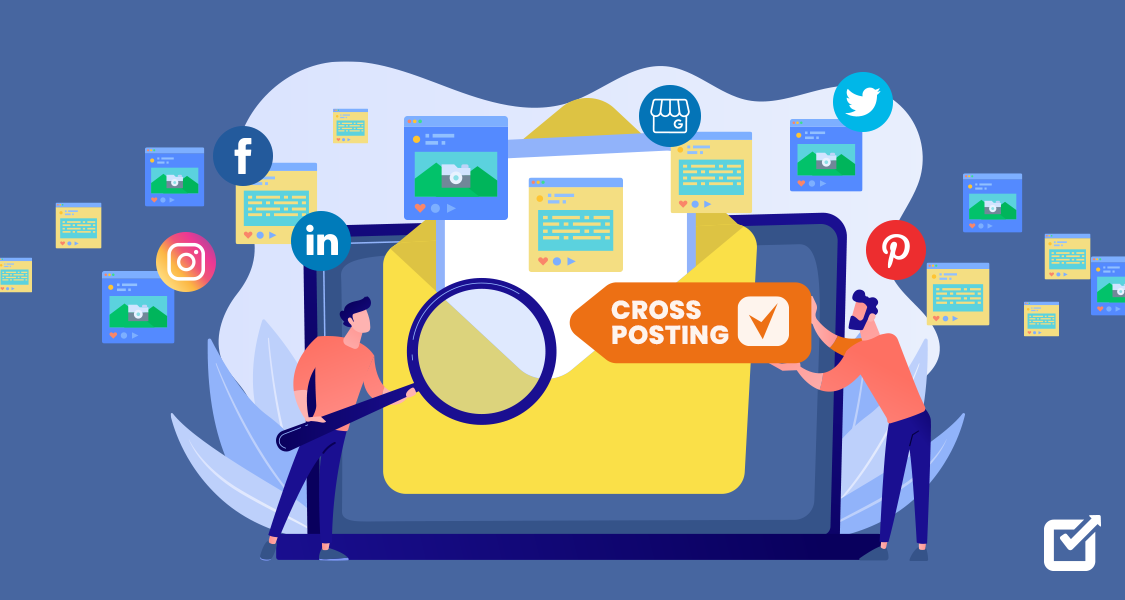Ready to accelerate your brand’s visibility and sales?
B2B content marketing isn’t just a buzzword—it’s a proven strategy that’s driving real results.
In fact, 58% of B2B marketers have seen a significant boost in sales over the past year, and 84% have witnessed a dramatic increase in brand awareness.
Sounds too good to be true? It’s not.
Content marketing has become a strategic necessity for businesses looking to build strong relationships, establish themselves as industry leaders, and drive sales.
But is it really worth the investment?
If you’re a B2B business owner wondering if content marketing is the real deal, you’re in the right place.
Let’s explore why content marketing is a must-have and discover the best content creation tools to help your business thrive.

Make Content Creation a Breeze with Social Champ
Tired of spending hours crafting content? Social Champ simplifies the process, allowing you to schedule, analyze, and optimize your content from a single dashboard!
Short Summary
- B2B content marketing focuses on using informative content to engage other businesses and build relationships rather than direct sales.
- The content types used include blog posts, ebooks, videos, and case studies, which attract leads and convert them into loyal clients.
- Key benefits include building trust, enhancing brand visibility, earning customer loyalty, generating leads, and improving SEO.
- Effective B2B content marketing strategies involve delivering valuable insights, optimizing for SEO, using diverse content formats, and maintaining consistent branding.
- Tools like Social Champ, Marketo, and Google Analytics are essential for managing and optimizing B2B content marketing efforts.
- Successful examples include Social Champ’s blog, Adobe’s creative campaigns, Oracle’s interactive content, and Microsoft’s customer success stories.
What Is B2B Content Marketing?
B2B content marketing is about using content to reach and engage other businesses.
Unlike traditional marketing, which often focuses on direct sales pitches, you provide information that establishes your company as an expert in your industry.
Think of it as building relationships with potential customers by providing them with genuinely helpful information and resources.
In B2B content marketing, you create content such as blog posts, ebooks, emails, newsletters, whitepapers, videos, and case studies.
This helps you attract potential customers, nurture leads, and ultimately convert them into loyal clients.
The content should be informative and relevant, providing solutions to problems that other businesses face.
Featured Article: 45+ Content Marketing Ideas (with Detailed Examples)
Why Content Marketing Is Important for B2B Businesses
There’s a reason why top B2B marketing teams allocate 25-30% of their budgets to content marketing.
To understand why this investment pays off, keep reading to discover the top reasons content marketing is crucial for B2B success.
Building Trust and Credibility
Content marketing helps you build trust and credibility with potential clients.
When you consistently produce high-quality, informative content, you showcase your expertise and reliability.
This builds confidence among prospects who are looking for trustworthy partners, leading to stronger business relationships and more successful collaborations over time.
Enhanced Brand Visibility
Creating and sharing valuable content boosts your company’s visibility in the market.
High-quality blog posts, articles, videos, and social media updates help you reach a wider audience.
Enhanced visibility attracts potential clients and keeps your brand top-of-mind for existing ones.
This increased exposure is crucial for building a strong presence in a competitive marketplace.
Earn Customer Loyalty
Consistently delivering valuable content helps businesses earn customer loyalty.
Addressing the needs and challenges of clients builds a deeper connection with their audience.
Engaged and loyal customers are more likely to become repeat buyers and advocates for the brand.
This loyalty is essential for sustaining long-term business success.
Generates Leads
One of the biggest perks of content marketing is how it can help you generate leads.
When you create great content, it naturally attracts and engages potential clients, smoothly guiding them through their buying journey.
By offering valuable solutions and insights, you can turn these interested prospects into qualified leads.
Plus, this approach is often more cost-effective and efficient than traditional marketing methods.
Feedback and Improvement
Content marketing opens up two-way communication between you and your audience.
Encouraging feedback and interaction through your content lets you learn valuable insights about your client’s needs and preferences.
These insights help you refine your products, services, and marketing strategies, leading to continuous improvement and better customer satisfaction.
Improves SEO
High-quality, relevant content pulls organic traffic to your site, helping you climb up those search engine rankings.
By using keywords effectively and creating engaging content, you ensure your business stands out in search results, attracting more traffic and potential leads.
Trust Building
Building trust is at the heart of B2B marketing, and content marketing is fantastic at this.
You position yourself as a go-to source for industry knowledge by consistently delivering accurate and valuable information.
This trust is essential for turning leads into clients and maintaining strong, long-term business relationships. Think case studies, testimonials, and expert articles.
Brand Identity
Content marketing is crucial for shaping and reinforcing your brand identity.
You can highlight your values, mission, and what sets you apart through consistent messaging and storytelling.
A strong brand identity helps you stand out and connect more deeply with your target audience.
It’s all about making your mark and building a brand that people recognize and respect.
Featured Article: How To Use Offline Marketing To Boost Your Social Media Marketing
Types of Content for B2B Marketing
In B2B marketing, choosing the right type of content can make all the difference.
With options ranging from detailed whitepapers to interactive webinars, each format serves a unique purpose and can engage your audience in distinct ways.
Here’s a rundown of the most effective types of content for B2B success to help you determine which formats will best engage your audience and drive results.
Ebook
Ebooks are comprehensive resources that provide in-depth information on specific topics relevant to the target audience.
They typically cover subjects in greater detail than blog posts and serve as definitive guides, offering valuable insights and actionable advice.

A content marketing starter kit ebook by Good Content Ebooks are often used to generate leads by offering downloadable content in exchange for contact information.
They help establish a company’s authority and expertise in the industry, making them an essential tool for building trust and credibility.
Blog
Blog posts are a fundamental component of B2B content marketing. They provide a platform for sharing insights, industry trends, and expert advice.
Regularly updated blogs drive organic traffic to a company’s website, improve SEO rankings, and establish the business as a thought leader.

Blogs by Grammarly targeting other businesses They allow for in-depth exploration of topics relevant to the target audience, helping to build trust and engage potential clients.
Blogs also provide opportunities for audience interaction through comments and social media sharing.
Podcast
Podcasts are audio content that can be consumed on the go. It offers a convenient way for busy professionals to access information.
They can feature industry experts, thought leaders, and company executives discussing relevant topics, trends, and insights.
Podcasts help in building a loyal audience and establishing the business as a thought leader.

A podcast by B2B Marketing with industry experts They also provide an opportunity for deeper engagement through interviews and discussions, making complex topics more accessible and engaging.
Interactive Quizzes
Interactive quizzes are engaging tools that capture the audience’s interest and provide personalized insights based on their responses.
They are effective for lead generation as they often require users to submit contact information to receive results.
Quizzes can be used to educate the audience, assess their needs, and recommend tailored solutions.
This interactive format enhances user engagement and provides valuable data that can inform marketing strategies and content development.
Social Media Posts
Social media posts are short, engaging content shared on social media platforms.

A social media post by Ufi VocTech Trust They help build brand awareness, drive traffic to the company’s website, and engage with the audience in real time.
Social media posts can include links to long-form content, quick tips, industry news, and interactive elements like polls and questions.
Maintaining an active social media presence is essential for fostering community engagement and staying top-of-mind with potential clients.
Whitepapers
Whitepapers are in-depth reports or guides on specific topics, often presenting detailed research, data, and analysis.
They demonstrate the company’s expertise and thought leadership, making them valuable for educating the audience and supporting decision-making processes.
Whitepapers are typically gated, meaning they can help generate leads by requiring contact information for access.
They provide comprehensive solutions to complex problems, reinforcing the business’s credibility and authority.
Infographic
Infographics are visual representations of information, data, or knowledge intended to present complex information quickly and clearly.
They are effective in B2B marketing because they can simplify complex topics and make data more digestible.
Infographics are highly shareable, which can help increase brand visibility and reach a broader audience.
They can be used on websites, social media, and in presentations to convey information in an engaging and easily understandable format.
Video Content
Videos are engaging content that can capture attention and convey messages effectively.

A video by Ahrefs on YouTube They can include product demonstrations, customer testimonials, explainer videos, and more.
Videos are versatile and can be shared across multiple platforms, including websites, social media, and email campaigns.
They help humanize the brand and make complex information more accessible and engaging, enhancing the overall customer experience.
Case Studies
Case studies showcase real-life examples of how a company’s products or services have successfully addressed client challenges.
They provide tangible proof of the business’s capabilities and effectiveness.

Case studies published by Canva Case studies help potential clients understand the company’s practical applications and benefits.
They are powerful tools for building credibility and trust, as they highlight measurable outcomes and customer satisfaction.
This makes them essential for converting leads into clients.
Testimonials
Testimonials are statements from satisfied clients highlighting their positive experiences with the company’s products or services.

Testimonials serve as social proof, demonstrating the value and effectiveness of the business’s offerings.
To build trust and credibility, testimonials can be featured on websites, social media, and marketing materials.
They provide potential clients with reassurance and confidence, helping to influence their decision-making process and convert leads into customers.
Featured Article: How To Use Offline Marketing To Boost Your Social Media Marketing
Best Practices for B2B Content Marketing
Effective B2B content ideas require more than creating and sharing content,
They involve a strategic approach to ensure your efforts resonate with your audience and drive results.
Here are some key strategies to optimize your B2B content marketing efforts.
Provide Value and Insight
Focus on delivering content that offers real value and actionable insights. Avoid overly promotional material; instead, aim to educate and inform.
High-quality content that solves problems or provides expert advice positions your company as a trusted authority in the industry.
Offering valuable insights helps build credibility, and fosters trust with your audience.
Optimize for SEO
Search engine optimization (SEO) is essential for increasing the visibility of your content.
Use relevant keywords, create compelling meta descriptions, and optimize headings and images to improve search engine rankings.
Incorporate internal and external links to enhance the user experience and boost your content’s authority.
Regularly updating content and monitoring SEO performance can help maintain and improve visibility.
Utilize Multiple Content Formats
Diversify your content formats to reach a broader audience and cater to different preferences.
Combine blog posts, ebooks, videos, infographics, and podcasts to engage users in various ways.
Using multiple formats also helps address different stages of the buyer’s journey, from awareness to decision-making, and keeps your content strategy dynamic and engaging.
Maintain Consistent Branding
Ensure all content aligns with your company’s brand identity, including tone, style, and messaging.
Consistency in branding helps build recognition and reinforces your company’s image across all channels.
Develop a style guide to maintain uniformity in content presentation and messaging, ensuring that every piece of content reflects your brand’s values and personality.
Utilize Data and Analytics
Utilize data and analytics to measure the effectiveness of your content marketing efforts.
Track key metrics such as engagement, click-through, conversion, and lead generation.
Analyzing this data provides insights into what’s working and what needs improvement.
Use these insights to refine your content strategy, optimize performance, and achieve better results.
Promote Your Content
Creating great content is only part of the process; promoting it effectively is equally important.
Share your content across various channels, including social media, email newsletters, and industry forums.
Use paid advertising and content distribution platforms to reach a wider audience.
Engaging in partnerships and collaborations can also help amplify your content’s reach and impact.
Engage With Your Audience
Your content should encourage interaction and engagement. Prompt your audience to comment, share, and participate in discussions.
Respond to comments and questions to foster community and build relationships with your audience.
Engaging with your audience enhances the user experience and provides valuable feedback for improving your content strategy.
Keep Content Fresh and Relevant
Regularly update and refresh your content to ensure it remains relevant and accurate.
Stay informed about industry trends and changes to keep your content up-to-date.
Refreshing older content with new insights and data can also improve its performance and maintain its value over time.
Consistent content updates help keep your audience engaged and informed.
Focus on Quality Over Quantity
Prioritize creating high-quality content over producing a large volume of material.
Quality content that is well-researched, well-written, and visually appealing is more likely to engage and convert your audience.
Invest time and resources in developing content that meets high standards and provides genuine value.
Quality content builds trust and enhances your brand’s reputation in the long run.
Tools and Platforms for B2B Content Marketing
Effective B2B content marketing hinges on using the right tools and platforms.
Whether you need analytics, content management, or automated distribution, choosing the right technology can amplify your efforts and deliver measurable results.
Here’s a look at some of the most essential tools and platforms that can help you keep up with the latest B2B content marketing trends.
Social Champ

Social Champ’s dashboard Social Champ is a great tool for B2B content marketing, offering several features designed to streamline social media content creation, scheduling, and analytics.
Its intuitive interface allows you to easily schedule posts across multiple social media platforms, ensuring consistent and timely content delivery.
With advanced analytics, Social Champ provides in-depth performance insights, helping you track engagement and optimize your strategy.
Its content calendar feature keeps your campaigns organized, while its social listening capabilities offer valuable feedback and trends.
Social Champ simplifies the complexities of managing social media, making it an essential platform for effective B2B marketing.

Elevate Your B2B Social Media Game With Social Champ!
Streamline your social media management with automated scheduling, bulk uploads, and comprehensive analytics.
Marketo

Marketo Engage’s landing page Marketo is a marketing automation platform that helps B2B businesses manage and optimize their marketing campaigns.
It offers features like lead management, email marketing, and analytics.
Marketo’s automation capabilities enable personalized marketing efforts, lead nurturing, and campaign tracking.
This makes it a comprehensive solution for driving engagement and conversion in B2B marketing.
Mailchimp

Mailchimp’s landing page Mailchimp is a widely used email marketing tool that offers a range of features for creating, sending, and analyzing email campaigns.
It provides customizable email templates, automation workflows, and segmentation options.
Mailchimp’s analytics help track key metrics such as open rates and click-through rates.
This enables businesses to refine their email strategies and effectively engage their B2B audience.
Google Analytics

Google Analytics’ landing page Google Analytics is an essential tool for measuring and analyzing the performance of your content marketing efforts.
It provides detailed insights into website traffic, user behavior, and content engagement.
Tracking metrics such as page views, bounce rates, and conversion rates helps you understand how your content performs and where improvements can be made.
Grammarly

Grammarly’s writing assistant Grammarly is a writing assistant that ensures your content is clear, grammatically correct, and error-free.
It offers real-time grammar and spell-checking, as well as suggestions for improving readability and style.
Grammarly is invaluable for maintaining high-quality, professional content that resonates with your B2B audience and upholds your brand’s credibility.
Clearscope

Clearoscope’s landing page Clearscope is a content optimization tool that helps improve the quality and relevance of your content.
It provides keyword research, content analysis, and optimization recommendations to enhance SEO performance.
Clearscope’s insights help ensure your content meets search engine standards and effectively addresses the needs and interests of your target audience.
Semrush

Semrush’s dashboard Semrush is an all-encompassing SEO and content marketing tool that offers insights into keyword research, competitor analysis, and content optimization.
It helps businesses identify high-performing keywords, track search engine rankings, and analyze competitors’ strategies.
Semrush’s comprehensive features are crucial for refining your content strategy and improving search engine visibility.
Ahrefs

Ahref’s landing page Ahrefs is a leading SEO tool that provides in-depth analysis of backlinks, keyword research, and content performance.
It helps businesses assess their website’s SEO health, track keyword rankings, and uncover opportunities for content improvement.
Ahrefs’ data-driven insights are essential for optimizing your B2B content ideas and enhancing search engine rankings.
Trello

Trello’s landing page Trello is a project management tool that uses boards, lists, and cards to organize and track content creation and marketing tasks.
It allows teams to collaborate, plan content calendars, and manage workflows effectively.
Trello’s visual and intuitive interface helps streamline content production processes, ensuring timely delivery and coordination among team members.
Inspiring B2B Content Marketing Examples for 2025
Now, let’s take a look at some of the leading brands and how they leverage content marketing.
Social Champ
If we are talking about some top examples of excellent content marketing strategies, it’d be unfair not to mention Social Champ.
Our blog is a go-to source for practical tips and the latest industry trends, designed to help B2B marketers stay informed.

A snapshot of Social Champ’s blog page We also offer valuable eBooks and guides that provide in-depth knowledge on various topics.
Our case studies and community talks highlight real-world success stories and shared experiences.
Social Champ also provides a glossary, and news sections keep you updated with essential information.
Plus, our stories and helpdesk offer additional support and insights to enhance your content strategy further.
Adobe’s Creative Campaigns
Adobe’s content marketing strategy includes engaging campaigns that highlight the creative potential of their products.
Their use of interactive content, such as live demos and tutorials, helps B2B audiences understand the practical applications of Adobe’s tools.

Adobe’s content marketing approach featuring its products and industry trends This approach not only drives interest but also demonstrates the value of Adobe’s solutions in real-world scenarios.
Oracle’s Interactive Content
Oracle uses interactive content, such as quizzes and calculators, to engage its B2B audience and provide personalized insights.
This approach helps potential clients understand how Oracle’s solutions can address their specific challenges.
By offering interactive and tailored content, Oracle enhances user engagement and drives conversions.
Microsoft’s Customer Success Stories
Microsoft shares detailed customer success stories highlighting how businesses successfully implement its solutions.
These stories, presented through case studies, videos, and infographics, demonstrate the real-world benefits of Microsoft’s products and services.
This content builds trust and serves as a powerful testament to Microsoft’s impact on its clients’ success.
Conclusion
B2B content marketing trends continue to evolve, offering numerous opportunities for businesses to connect with their audience, build trust, and drive growth.
Companies can create impactful marketing strategies by using diverse content, implementing best practices, and utilizing effective tools and platforms.
When creating B2B content marketing strategies, deliver value, make your storytelling engaging, and use data to make decisions.
Embracing these strategies will ensure that your content resonates with your audience and drives meaningful results in the dynamic landscape of B2B marketing.
































